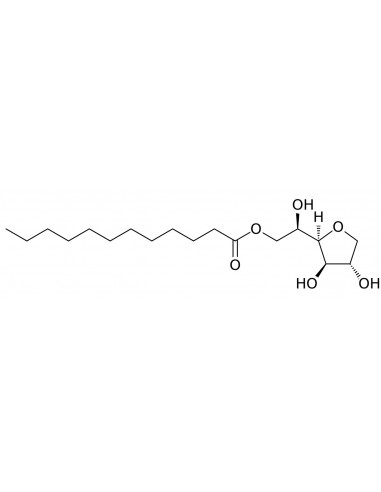Sorbitan monolaurate 20 (SPAN 20)
Sorbitan monolaurate 20, Span 20
- All vegetable
- Biodegradable
Sorbitan monolaurate 20, SPAN 20
SP20 V (VEGETABLE)
CAS 1338-39-2
Our sorbitan monolaurate (SP20 V) or SPAN 20 is a vegetable based product made according to GMP and NF standards.
It is a multi-functional non-ionic lipophilic surfactant often blended with Polysorbates such as TW 20, TW60 or TW80 ionic hydrophilic surfactants to achieved optimal HLB values.
In general, Sorbitans or Spans are lipophilic non-ionic surfactants that are used as emulsifying agents in the preparation of vaccines, creams and ointments for pharmaceutical and cosmetics and in food products.
Span20 V is amber to brown oily liquid and is non-toxic and odorless. It is slightly soluble in isopropanol, tetracarp, xylene, cotton seed oil and mineral oil, slightly soluble in liquid paraffin, and insoluble in water, HLB=8.6.
To see product specifications for SPAN20 go to down load tab or click here:
product specifications for SP20 KHV Certificates of analysis are available on request.
Call today for a free copy of HLB SYSTEM...a time-saving guide to emulsifier selection.
More on sorbitans and their uses...
Sorbitans are a group of sugar alcohol derivatives that find applications in both biological research and the food industry. They are commonly used as emulsifiers and stabilizers due to their ability to form stable emulsions and improve the texture and shelf life of various products.
In biological research, sorbitans, specifically sorbitan esters, are utilized as surfactants and solubilizing agents. Sorbitan monostearate (Span 60) and sorbitan monooleate (Span 80) are two commonly used sorbitan esters. They are employed in cell culture media, protein and lipid formulations, and drug delivery systems. Sorbitans facilitate the solubilization of lipophilic compounds, such as lipids, vitamins, and certain drugs, thereby improving their bioavailability and enabling their effective delivery. Additionally, they act as emulsifiers, helping to stabilize emulsions and enhance the dispersion of substances in aqueous and oil phases.
In the food industry, sorbitans are widely used as emulsifiers, stabilizers, and texture enhancers. Sorbitan monostearate (E491) and sorbitan tristearate (E492) are commonly employed in food applications. They contribute to the formation and stabilization of emulsions, preventing separation and enhancing the texture and mouthfeel of products. Sorbitans are used in various food items such as bakery goods, confectionery, ice cream, margarine, dressings, and beverages. They improve the structure and stability of aerated products, provide a smooth texture, and help extend the shelf life of food by preventing spoilage.
Sorbitans are considered safe for consumption and have been approved by regulatory agencies for use in food and pharmaceutical applications. They possess low toxicity and are well-tolerated by humans.
In summary, sorbitans, particularly sorbitan esters, are versatile additives in both biological research and the food industry. Their emulsifying, stabilizing, and solubilizing properties make them valuable tools for formulating pharmaceuticals, improving drug delivery, and enhancing the quality and texture of food products.

